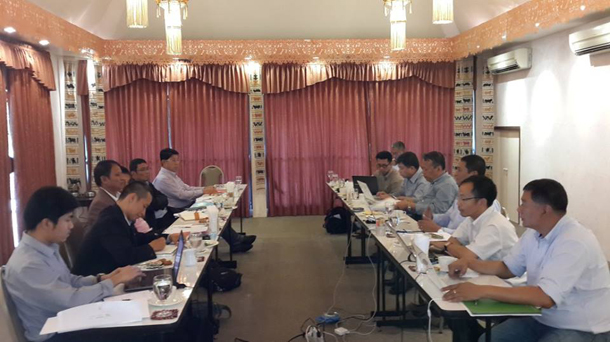Representatives from the United Nationalities Federal Council (UNFC), an alliance of major ethnic armed groups, have proposed that democracy icon Aung San Suu Kyi participate in their next talks with the Burmese government’s peace delegation.
Mahn Mahn, the head of UNFC’s technical team, told The Irrawaddy on Monday that he made the proposal at a meeting in Chiang Mai, northern Thailand, with the government’s Union Peacemaking Working Committee.
“They [government representatives] said they will report our proposal to the higher officials. They will reply to us by the end of this month,” Mahn Mahn said.
If the government peace team and Suu Kyi honor the UNFC request, it would be the first time the National League for Democracy (NLD) chairwoman has ever attended peace talks.
“It is necessary to have her at our talks at least as an observer if not a mediator. If we hold talks without mediators, we will face some problems when discussing sensitive issues such as military matters. And it is not good to have tension between us. So, we asked for mediators to avoid such tensions,” Mahn Mahn said.
“In the past, she [Suu Kyi] said that she was willingly to help the peacemaking process with the capacity she has as much as she can,” he added.
In July 2011, Suu Kyi said she was ready to take part in efforts to resolve ongoing armed conflicts between the government and ethnic rebel groups.
“I am ready to get involved and try to support ceasefire and peace processes with all of my efforts,” Suu Kyi wrote in an open letter to President Thein Sein and leaders of ethnic armed groups including the Kachin, Karen, Shan and Mon people.
“We also believe that Daw Aung San Suu Kyi’s efforts will very much help the ethnic groups in making peace,” Mahn Mahn said.
According to a statement released by the UNFC after weekend peace talks, its representatives proposed that the next meeting between the two sides take place in the first week of August. The venue would be in Thailand, Mahn Mahn said.
Mahn Mahn also called on the government to agree to a concrete political framework and asked the government not to settle merely for ceasefire agreements nationwide. He said government peace representatives wanted to push first for achieving ceasefires nationwide before establishing a framework for discussion of political issues, a timeline at odds with the UNFC technical team’s demand for simultaneous negotiating tracks.
“If a political agreement comes after a nationwide ceasefire agreement, the peace process will even go backward, like previous experiences that some ethnic armed groups have faced,” Mahn Mahn warned.
Many ethnic rebel groups including the Kachin Independence Organization (KIO), the second largest of Burma’s ethnic armed groups, signed ceasefire agreements with the former military regime in the 1990s. However, several of those ceasefires later broke down, including the government’s accord with the KIO, which fell apart in June 2011.
“To ensure that the peace process won’t go backwards, we proposed that a concrete and specific agreement on a political framework must come at the same time as a nationwide ceasefire agreement,” Mahn Mahn said.
For their meeting on Saturday, the UNFC’s technical team was led by Mahn Mahn, while the Burmese government’s delegation was led by Hla Maung Shwe, a leading member of the Myanmar Peace Center.
According to the UNFC statement, the two sides also exchanged views on the state of the peace process and political developments, and discussed matters relating to the Thein Sein government’s road map for peace, as well as the UNFC’s own plan on establishing a political dialogue.

















